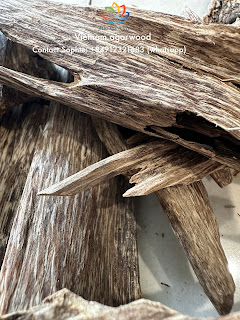Characteristics of Vietnamese Agarwood:
- Exceptional Quality: Vietnamese agarwood is regarded as some of the finest in the world due to its rich, deep aroma, which is highly sought after in the Middle East, East Asia, and beyond.
- Unique Fragrance: The scent is often described as a complex blend of sweet, woody, and earthy notes with a lasting effect.
- Rarity: Natural agarwood is extremely rare and forms when the Aquilaria tree is infected by certain fungi or bacteria. This rarity makes it highly expensive.
- Grading: Vietnamese agarwood is categorized based on factors like resin content, density, and scent. Higher resin concentration results in darker, denser wood, which is more valuable.
- Incense: Burned during religious ceremonies, meditation, or as a means of purifying spaces.
- Perfumes: Used as a base note in luxury perfumes due to its long-lasting and deep scent.
- Medicine: Traditional Vietnamese medicine utilizes agarwood for its purported properties, such as calming the mind and improving digestion.
- Spirituality: Considered a symbol of luck, wealth, and status, agarwood is often used in religious artifacts and jewelry.
Due to overharvesting and habitat loss, wild Aquilaria trees have become endangered. To address this, Vietnam has developed sustainable agarwood cultivation practices:
- Plantations: Aquilaria trees are now grown in managed plantations, and artificial inoculation methods are used to induce resin formation.
- Research and Development: Efforts are being made to improve resin yield and quality while preserving wild populations.
Vietnamese agarwood is highly regarded in the global market and is exported to countries such as Japan, China, and the Gulf states. Its cultural and economic importance continues to drive both traditional practices and modern innovations in the industry.














